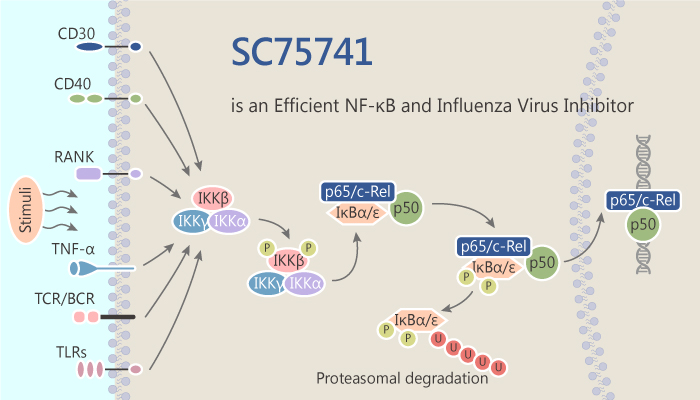Influenza is one of the major plagues worldwide. Particularly, Influenza is a viral infection that attacks our respiratory system. Influenza A virus remains a major public health concern, both in its annual toll in death and debilitation and its potential to cause devastating pandemics. One of the hallmark signaling factors activated by viral pathogens is the transcription factor NF-κB. Activation of NF-κB leads to the up-regulation of a variety of antiviral genes. NF-κB is the main regulator of cytokine and chemokine production in general and during severe influenza in particular.
In this study, EmanuelHaasbach, et al show the novel NF-κB inhibitor SC75741. Especially, SC75741 significantly protects mice against lethal challenge with highly pathogenic avian influenza A viruses from the H7N7 and H5N1 subtypes. Moreover, SC75741 protects mice against highly pathogenic avian influenza A virus.SC75741 shows a broad therapeutic index in cell culture. SC75741 treatment of IAV infected cells results in retention of vRNP in the nucleus and significantly protects mice against HPAI viruses (H5N1&H7N7). Treatment is efficient when SC75741 is given intravenously in a concentration of 5 mg/kg/day. In addition, application of SC75741 via the intraperitoneal route results in a high bioavailability and is also efficient against influenza when given 15 mg/kg/day or 7.5 mg/kg/twice a day. SC75741 reduces viral replication and H5N1-induced IL-6 and IP-10 expression in the lung of infected mice.

All in all, SC75741 inhibits replication of influenza A and B viruses. SC75741 specifically inhibits NF-κB-mediated signalling on a transcriptional level. In particular, SC75741 inhibits transcriptional activation of NF-κB-dependent genes. SC75741 reduces virus replication and cytokine expression in vivo.